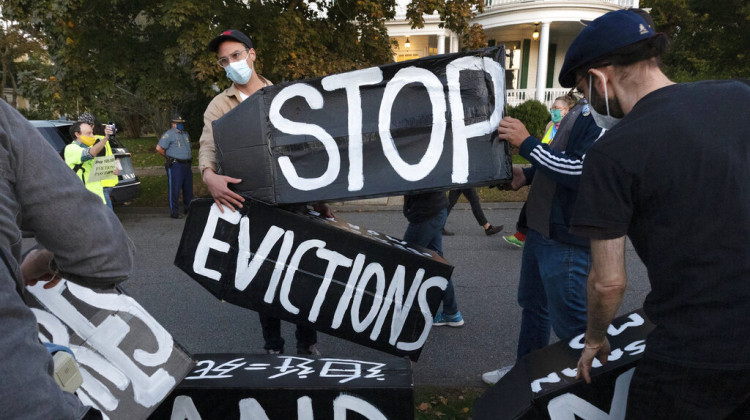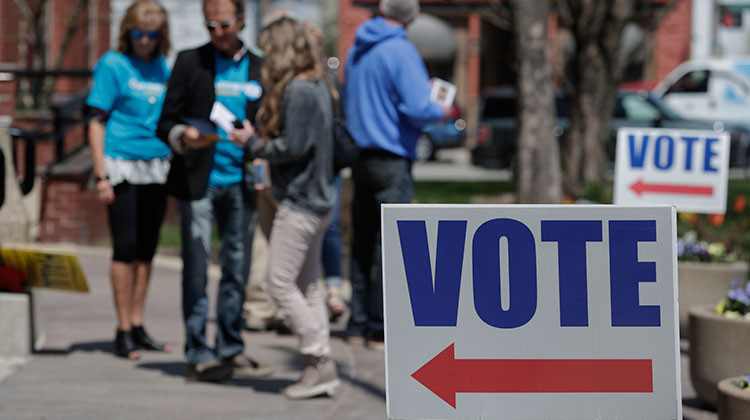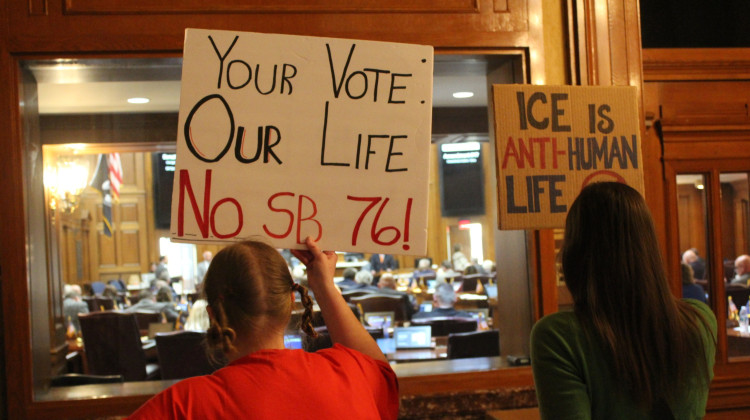
FILE - In this Oct. 14, 2020, file photo, housing activists erect a sign in Swampscott, Mass. A federal freeze on most evictions is set to expire soon. The moratorium, put in place by the Centers for Disease Control and Prevention in September, was the only tool keeping millions of tenants in their homes.
AP Photo/Michael Dwyer, FileINDIANAPOLIS (AP) — A federal freeze on most evictions that was enacted last year is scheduled to expire July 31, after the Biden administration extended the date by a month. The moratorium, put in place by the Centers for Disease Control and Prevention in September, has been the only tool keeping millions of tenants in their homes. Many of them lost jobs during the coronavirus pandemic and have fallen months behind on their rent.
Landlords successfully challenged the order in court, arguing that they also had bills to pay. They pointed out that tenants could access more than $45 billion in federal money set aside to help pay rents and related expenses.
Advocates for tenants say the distribution of the money has been slow and that more time is needed to distribute it and repay landlords. Without an extension, they feared a spike in evictions and lawsuits seeking to boot out tenants who are behind on their rent.
As of June 7, roughly 3.2 million people in the U.S. said they would face eviction within the next two months, according to the U.S. Census Bureau’s Household Pulse Survey. The survey measures the social and economic effects of the coronavirus pandemic every two weeks through online responses from a representative sample of U.S. households.
Here’s the situation in Indiana:
What's The Status Of Eviction Moratorium's In The State?
Indiana is one of several states that enacted a moratorium last year halting eviction proceedings. The measure expired in August, though. The CDC's moratorium has been in place since September.
Andrew Bradley, policy director for Prosperity Indiana, said more than 45,000 eviction filings have been made in Indiana during the pandemic, including nearly 16,000 in the Indianapolis metropolitan area.
What's Being Done To Help People Facing Eviction?
Housing officials said they’re reaching out to landlords in an attempt to reduce the number of impending evictions and are encouraging anyone who may be at risk of eviction to apply for rental assistance through their area’s housing authority.
Andrew Merkley, a housing specialist for the Indianapolis Office of Public Health and Safety, said more funding from the federal American Rescue Plan can be budgeted toward rental assistance if state and local governments choose to do so, noting that Indianapolis has already granted more than $10 million to nearly 4,000 households within the past two months.
Jacob Sipe, executive director of the Indiana Housing and Community Development Authority, said the state's emergency program required only $10 million of the $371 million Indiana received from the federal government to administer rental assistance programs, however. Although that funding has assisted more than 7,000 renters by providing up to four monthly payments of up to $500, or a year’s worth of utility bills, Sipe said program applications have slowed in recent weeks.
By September, 60%, or $222.6 million, of the money needs to be spent or earmarked. All of the money must be spent or assigned to renters by the end of the year.
How Are The Courts Handling Eviction Hearings?
Anticipating spikes in eviction petitions filed after the statewide moratorium lifted last summer, the Indiana Supreme Court's Landlord Tenant Task Force encouraged landlords and tenants to talk to each other, explore options, discuss payment plans and put all agreements in writing. Procedures and practices have varied across the state, though many courts have launched mediation programs to provide an alternative to evictions.
How Affordable Is Housing In The State's Major Rental Market?
Indiana has a gap of 127,000 affordable units statewide, with only 37 affordable and available units per 100 families, Bradley said. He added that although Indiana is a low cost-of-living state, small towns and rural communities have reported higher eviction rate surges than in larger municipal areas.
“People who (are low income), they’re spending a lot of their income on housing,” Bradley said. “So if they lost any income during COVID, that really quickly puts them under water.”
As of May, the median monthly rent in the Indianapolis metropolitan area had risen by 9.7% over the last year, to $1,093, according to a report released June 16 by Realtor.com. Median rents for a one-bedroom apartment rose by 8.7%, while two-bedroom units jumped by 14.1%.
Are Evictions Expected To Create A Surge In Homelessness?
A spike in evictions is expected once the CDC moratorium expires, which is what happened when the state's moratorium expired last year, said Amy Nelson, executive director of the Fair Housing Center of Central Indiana.
Although no statewide data exists, Indiana housing experts estimated that roughly 13% of tenants — about 106,000 Indiana households — are at risk of eviction. Recent census data showed that 56,000 state residents were concerned they could be evicted within two months.
___
Casey Smith is a corps member for the Associated Press/Report for America Statehouse News Initiative. Report for America is a nonprofit national service program that places journalists in local newsrooms to report on undercovered issues.
 DONATE
DONATE






 Support WFYI. We can't do it without you.
Support WFYI. We can't do it without you.